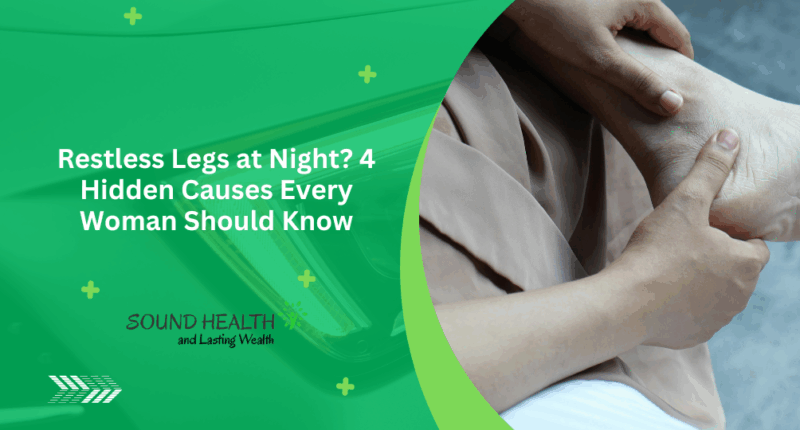How memories are formed in your brain is a complex process involving the encoding, storage, and retrieval of information by networks of neurons. However, aging is one of the top causes of memory loss, as it affects brain function and neural connections. Beyond aging, three more common causes of memory loss include certain medical conditions, medications, and nutritional deficiencies. Interestingly, restless legs syndrome (RLS) is a condition that often disrupts sleep and can indirectly impact memory and overall brain health.

What is restless legs syndrome?
It is a neurological disorder characterized by an uncontrollable urge to move the legs, usually accompanied by uncomfortable sensations such as crawling, twitching, or tingling. These symptoms typically emerge in the evening or at night, especially when sitting or lying down, making restful sleep difficult. Brynna Connor, MD, Healthcare Ambassador at NorthWestPharmacy.com, notes that RLS symptoms are commonly sneaky and often misunderstood, affecting many women.
What causes restless legs?
While the exact cause is not fully understood, several factors are linked to the development of RLS, including genetics, iron deficiency, hormone changes, and certain medications. Dr. Connor highlights four sneaky causes of restless legs that every woman should be aware of:
Low Iron: Iron deficiency is among the most significant contributors to RLS. Iron plays a crucial role in dopamine production in the brain, which regulates movement. Low iron levels can impair dopamine function, worsening RLS symptoms.
Menopause Hormone Shifts: Hormonal fluctuations during menopause, especially changes in estrogen levels, can trigger or exacerbate restless legs. Women are more prone to RLS, particularly during pregnancy and menopause, linking reproductive hormones to the syndrome.
Certain Medications: Some medications, including antihistamines and antidepressants, may contribute to or aggravate RLS symptoms. Awareness of medication side effects is essential for managing RLS effectively.
Other Deficiencies: Besides iron, deficiencies in magnesium, folate, or vitamin B12 may also play a role in restless legs syndrome by affecting nerve function and muscle control.
Understanding these causes helps in managing RLS through targeted lifestyle changes and medical interventions. For example, addressing iron deficiency through supplements, regulating hormone balance, reviewing medications with a healthcare provider, and ensuring adequate nutrient intake can offer relief. Additionally, non-pharmacological measures like leg massages, warm baths, and regular moderate exercise can alleviate symptoms and improve sleep quality.
In the broader context of memory loss, it is important to recognize that RLS, by disrupting sleep, can indirectly contribute to forgetfulness and cognitive issues. Ensuring good sleep hygiene and managing restless legs symptoms are vital steps toward maintaining both physical comfort and brain health as one ages.
This article aims to shed light on restless legs syndrome’s often overlooked causes and offer simple fixes that women can implement, improving their nightly comfort and overall quality of life.
How Memories Are Formed and Lost
Memories form in the brain through a sequence of stages: encoding (acquiring information), storage (maintaining it), and retrieval (accessing it). The hippocampus is a key brain region involved in this process. Yet, aging reduces neural plasticity and the efficiency of these memory pathways, making recall more challenging over time. Besides aging, medical conditions such as Alzheimer’s disease, stroke, depression, and lifestyle factors like stress and poor sleep contribute to memory loss. Some medications also influence cognitive function, particularly in older adults.
What Is Restless Legs Syndrome? Defining the Condition
Restless Legs Syndrome (RLS) is a neurological disorder that causes uncomfortable sensations in the legs, often described as crawling, tingling, or twitching, prompting an irresistible urge to move. Symptoms usually worsen in the evening and night and when at rest. Movement temporarily relieves discomfort, but the cycle frequently disrupts sleep and quality of life. RLS affects about 5-10% of the population, with a higher prevalence in women, especially during pregnancy and menopause.
Four Sneaky Causes of Restless Legs Every Woman Should Know

1. Low Iron Levels: The Hidden Culprit
Iron deficiency is a well-established factor in RLS due to iron’s critical role in dopamine synthesis. Even mild iron depletion can worsen symptoms, and blood tests often underestimate brain iron levels. Women, especially those with heavy menstrual cycles or pregnancy, are more susceptible to iron deficiency, making this a common but frequently overlooked cause.
2. Hormone Shifts During Menopause
Hormonal fluctuations during menopause, particularly declining estrogen levels, significantly affect neurotransmitter systems involved in RLS. Research indicates that menopausal women experience increased severity and frequency of symptoms, linking hormonal changes to the condition’s onset or worsening.
3. Medications That May Trigger or Worsen RLS
Certain drugs, such as antihistamines, antidepressants, and some blood pressure medications, can provoke or exacerbate restless legs symptoms. Careful medication review with healthcare providers can identify and adjust such triggers, improving symptom control.
4. Other Nutritional Deficiencies Affecting Nerve Health
Deficiencies in magnesium, folate, and vitamin B12 may also contribute by impairing nerve and muscle function. These nutrients support nerve conduction and muscle relaxation, which are vital for preventing involuntary leg movements.
Simple Fixes That Make a Difference
Iron Supplementation: Especially for women with identified deficiency; consult a healthcare provider for appropriate dosing.
Hormone Therapy: For menopausal women, hormone replacement may alleviate symptoms but requires medical guidance.
Medication Review: Adjusting or switching medications under doctor supervision may relieve RLS.
Dietary Changes: Ensuring sufficient intake of magnesium, folate, and B12 through foods or supplements.
Lifestyle Adjustments: Regular moderate exercise, avoiding caffeine and alcohol before bed, and maintaining good sleep hygiene.
Physical Relief: Leg massages, warm baths, heat or cold compresses, and specialized RLS foot wraps can soothe symptoms.
Dr. Brynna Connor’s insights emphasize understanding the unique factors affecting women with restless legs, enabling tailored interventions for better sleep and life quality.
This comprehensive understanding equips women to address restless legs syndrome with informed strategies promoting relief and restful nights. Awareness of how RLS ties into broader issues like memory loss and aging highlights the importance of holistic health care in maintaining overall well-being.
If symptoms persist or worsen, consulting a healthcare professional specialized in sleep or neurological disorders is essential for personalized diagnosis and treatment.
Also Read | Fast Bunion Pain Relief: Effective Self-Care Remedies That Work









